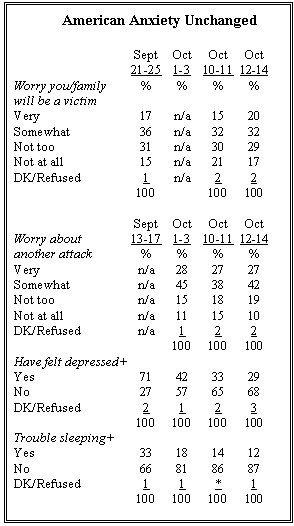Introduction and Summary
Reports of new anthrax cases in New York and elsewhere are not raising public anxiety or further demoralizing Americans. Reports of depression, sleeplessness and concern over renewed terrorism have not increased following the news on Oct. 12 that an NBC employee had been infected with anthrax. In the wake of those reports, about three-in-ten (29%) this weekend said they were feeling depressed, compared to 33% who made such reports earlier in the week, and 42% who said they had felt depressed in early October. The number who have experienced insomnia also declined from 18% in early October to 12% this weekend.

While new anthrax outbreaks have not panicked or demoralized the public, fears over terrorism remain high. About seven-in-ten (69%) have some concern over new attacks, and better than half (52%) are at least somewhat worried that they or their families could become victims of terrorism. There has been no increase in these concerns since early October and no spike in worries this weekend.
The latest Pew Research Center survey, conducted Oct. 10-14, shows that, as in previous polls, many more women than men are experiencing psychological stress related to terrorism. Four-in-ten women reported feelings of depression compared to only about one-in-five (21%) men. Better than twice as many women as men have experienced insomnia (19% to 7%). Women are more worried about new terrorist attacks, and are more likely to express concern that they or their families could fall victim to terrorism.
The survey shows that a solid majority of Americans (59%) believe that the military, rather than news organizations, should exert more control over news on the war in Afghanistan. That is about the same proportion that supported military censorship in the Persian Gulf War a decade ago (57%). Nearly seven-in-ten Republicans (68%) back military control over war news, compared to only about half (53%) of Democrats.
A narrower majority (52%) believes that U.S. news organizations should not show videotaped speeches by suspected terrorist leader Osama bin Laden. Partisan differences on this issue are minimal, but there is a significant age gap. While most Americans under age 30 (55%) say the media should air bin Laden’s messages; majorities in other age groups favor censoring his speeches.




